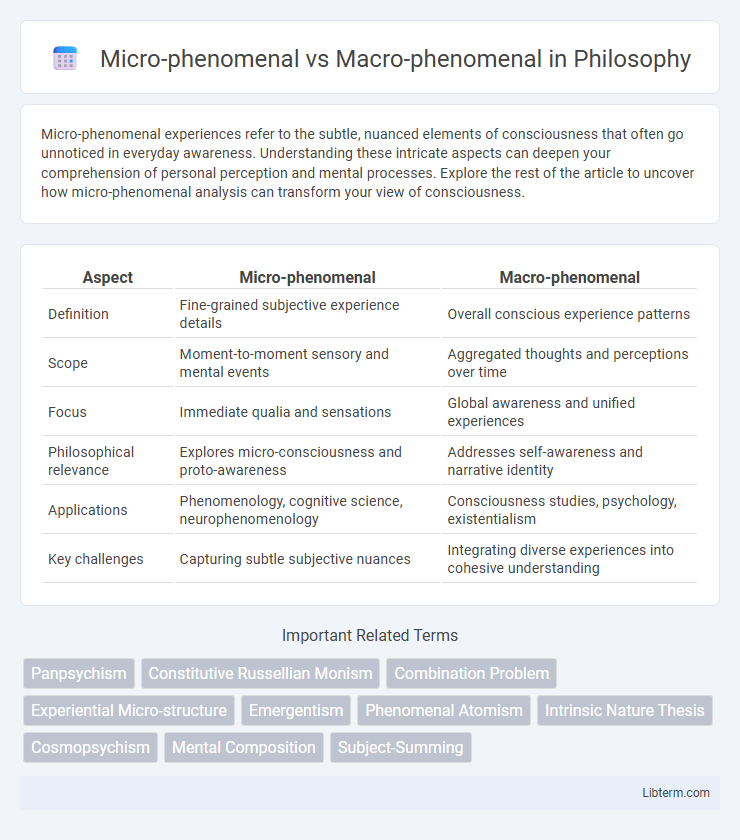Micro-phenomenal experiences refer to the subtle, nuanced elements of consciousness that often go unnoticed in everyday awareness. Understanding these intricate aspects can deepen your comprehension of personal perception and mental processes. Explore the rest of the article to uncover how micro-phenomenal analysis can transform your view of consciousness.
Table of Comparison
| Aspect | Micro-phenomenal | Macro-phenomenal |
|---|---|---|
| Definition | Fine-grained subjective experience details | Overall conscious experience patterns |
| Scope | Moment-to-moment sensory and mental events | Aggregated thoughts and perceptions over time |
| Focus | Immediate qualia and sensations | Global awareness and unified experiences |
| Philosophical relevance | Explores micro-consciousness and proto-awareness | Addresses self-awareness and narrative identity |
| Applications | Phenomenology, cognitive science, neurophenomenology | Consciousness studies, psychology, existentialism |
| Key challenges | Capturing subtle subjective nuances | Integrating diverse experiences into cohesive understanding |
Introduction to Phenomenal Consciousness
Phenomenal consciousness refers to the subjective experience or the 'what it is like' aspect of mind, encompassing both micro-phenomenal and macro-phenomenal levels. Micro-phenomenal consciousness involves the fine-grained, moment-to-moment sensations and perceptions, such as the precise experience of color or sound at an instant. Macro-phenomenal consciousness aggregates these micro-experiences into a coherent, broader experiential state, like the overall feeling or mood during a conscious episode.
Defining Micro-phenomenal States
Micro-phenomenal states refer to the intricate, detailed experiences occurring at the smallest scale of consciousness, capturing the subtle qualities of sensory input and internal processing. These states contrast with macro-phenomenal experiences, which encompass broader, integrated conscious awareness involving multiple micro-level components. Defining micro-phenomenal states requires analyzing the fine-grained aspects of perception and mental representation, such as specific shades of color, distinct tactile textures, or discrete auditory tones.
Understanding Macro-phenomenal Experience
Macro-phenomenal experience encompasses the integrated, large-scale subjective qualities of consciousness that arise from the collective interaction of micro-phenomenal components, such as individual neural events or sensations. Understanding macro-phenomenal experience involves analyzing how discrete micro-phenomenal experiences combine to form the coherent, unified awareness humans report in everyday life. Research in cognitive neuroscience and phenomenology seeks to map these connections, revealing the mechanisms by which micro-level brain processes generate the rich, unified macro-level subjective reality.
Historical Background and Philosophical Roots
Micro-phenomenal and macro-phenomenal distinctions trace back to the early 20th-century phenomenology movement initiated by Edmund Husserl, who emphasized the detailed analysis of conscious experience at varying levels of granularity. The micro-phenomenal level examines fine-grained, moment-to-moment sensory and qualitative experiences, whereas macro-phenomenal refers to broader, integrative structures of experience that give coherence and meaning. Philosophically, this dichotomy intersects with debates in the philosophy of mind concerning the nature of consciousness, influenced by scholars like Brentano, who introduced intentionality, and later by the analytic tradition exploring the levels of conscious states.
Key Differences between Micro- and Macro-phenomenal
Micro-phenomenal aspects refer to the fine-grained, subjective experiences at the smallest scale of consciousness, such as individual sensory qualities or moment-to-moment awareness. Macro-phenomenal aspects encompass broader, integrated experiences that combine multiple micro-phenomenal elements into coherent, holistic states of consciousness. Key differences lie in the scope and integration level: micro-phenomenal involves isolated, specific experiential properties, while macro-phenomenal reflects the unified, global experience arising from the synthesis of numerous micro-phenomenal components.
Theories and Approaches in Philosophy of Mind
Micro-phenomenal approaches in philosophy of mind emphasize the fine-grained, moment-to-moment structures of conscious experience, often explored through neurophenomenology and first-person methodologies. Macro-phenomenal theories focus on the broader, holistic aspects of consciousness, including narrative and cognitive integration, frequently addressed in functionalism and global workspace theory. These contrasting perspectives shape debates on the nature of qualia, the binding problem, and the explanatory gap between subjective experience and physical processes.
Micro-phenomenal in Neuroscience and Cognitive Science
Micro-phenomenal aspects in neuroscience and cognitive science refer to the fine-grained, moment-to-moment experiential qualities of conscious states, closely linked to neural activity patterns and synaptic interactions. These micro-level phenomena capture subtle variations in sensory perception, emotional responses, and cognitive processes, providing insight into the neural correlates of consciousness. Understanding micro-phenomenal states enables researchers to map precise brain mechanisms underlying subjective experience and elucidate how localized neural circuits contribute to conscious awareness.
Macro-phenomenal in Social and Collective Contexts
Macro-phenomenal experiences encompass shared social and collective phenomena that arise from the interactions and combined consciousness of groups, shaping cultural norms, collective memory, and societal values. These large-scale experiences are foundational in understanding how societies construct meaning and identity through common rituals, language, and collective emotions. The macro-phenomenal level highlights the interplay between individual consciousness and the overarching social structures that influence collective behavior and thought patterns.
Implications for Consciousness Studies
Micro-phenomenal aspects of consciousness refer to the fine-grained, subjective qualitative experiences at a moment-to-moment level, while macro-phenomenal aspects capture the broader, integrated states of awareness over extended periods. Understanding the interplay between these micro- and macro-phenomenal layers is crucial for developing comprehensive models of conscious experience and addressing the explanatory gap in consciousness studies. This distinction informs neurophenomenology by linking precise neural correlates with holistic experiential states, ultimately enhancing the scientific investigation of how consciousness emerges and functions.
Future Directions and Open Questions
Future directions in micro-phenomenal studies emphasize refining neural correlates of specific conscious experiences to bridge gaps in understanding macro-phenomenal consciousness. Open questions include how micro-phenomenal details integrate into unified macro-phenomenal states and the mechanisms underlying this hierarchical assembly. Advancements in neuroimaging and computational modeling are critical to unraveling these complex interactions and enhancing the explanatory power of consciousness research frameworks.
Micro-phenomenal Infographic

 libterm.com
libterm.com